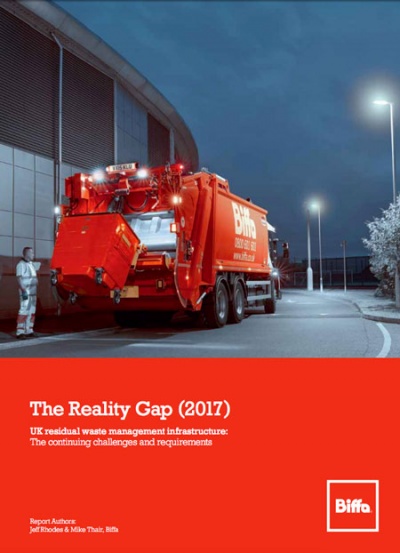Biffa becomes latest waste giant to decry EfW capacity gap
Biffa is the latest waste management big hitter to underline the supposed need for the UK to expand its energy-from-waste (EfW) infrastructure to capitalise on a post-Brexit world.
In its major new report – ‘The Reality Gap 2017’ – Biffa stresses the need for a coherent environment strategy to steer a course for UK environment policy through the choppy waters to come once the UK completes its departure from the European Union.
The report, a follow-up to the company’s original Reality Gap report published in 2015, calls on industry and government to come together to form a joined up strategy to enable the UK to formulate a robust response to the myriad of issues and stark realities that will be thrown up following Brexit, including a capacity gap in EfW treatment.

Although the UK has made marked steps forward in environmental policy over the past decade, Biffa’s report identifies what it thinks are number of key challenges to which the waste and resources industry will have to respond in order to safeguard and advance the sector’s role as a productive part of the wider UK economy.
Challenges ahead
The report’s findings present five key issues with which the UK will have to deal in a post-Brexit world. These are:
- A persistent shortfall in EfW capacity – Biffa’s report predicts, contrary to Eunomia’s, that the UK’s EfW capacity, currently at around 13 million tonnes per annum, is likely to drop in the next few years, down to six million tonnes per annum by 2025. According to Biffa, this situation will be made more acute by difficulties in Advanced Thermal Treatment (ATT) projects and plateauing recycling rates coupled with increasing waste arisings.
- Reduced landfill capacity – The UK is running out of landfill space amid policy that has sought to reduce the country’s reliance on landfill, respecting the waste hierarchy. Biffa proposes that existing facilities are safeguarded and new facilities be created, stating that landfill still has a role to play in the UK’s waste management strategy.
- The private sector is capable of dealing with a capacity gap provided there is coherent, long-term environmental policy in place – Biffa’s report states an urgent need for new treatment facilities to be built, and claims the conditions are right for this, pointing to a number of privately financed facility projects, although it will need a consistent and joined-up environmental policy and infrastructure policy to bring these projects to fruition.
- UK recycling rates have stagnated and further gains are likely to be limited – While acknowledging the UK’s improved recycling performance in recently years, Biffa says that recycling rates have stagnated and the prospects of future significant improvements will be limited unless the political will manifests to stimulate secondary materials demand, through measures like eco-design and Extended Producer Responsibility. Inconsistency in recycling reporting across Europe may also be masking the UK’s true recycling rates, which may be more or less impressive in comparison to other European states when this is taken into account.
- More must be done to share commodity price movements in the recycling sector – Biffa suggests that local authorities are warming to the need to share exposure to the inherent volatility in commodity values, although the firm claims more must be done regarding commodity risk transfer in order to attract more much-needed capital to facilitate further growth in recycling.
Commenting on the report and its findings, Biffa CEO Ian Wakelin said: “The UK has achieved a great deal in terms of improving its environmental credentials. We should be proud of this. But we are at a crossroads when it comes to the future of our environmental strategy, made all the more critical and timely by the prospect of a post-Brexit world.
“The waste industry is more than capable of rising to these challenges and needs clear policy direction to enable the necessary capital investments to be made. At Biffa, we relish the challenge and look forward to working with industry and government to create an integrated solution which we can all get behind.”
Heated debate
As has been reported, there has been a considerable display of support for the expansion of EfW treatment capacity in the UK from the big waste management companies and some key environmental figures in recent weeks.
Following the release of Eunomia’s report at the start of August, stating that the UK would reach residual waste treatment overcapacity by 2020/21, with excess capacity increasing to 9.5 million tonnes by 2030/31, ESA Executive Director Jacob Hayler branded Eunomia’s report “flawed”, saying it had “been contradicted by report after report from everyone else” and risked allowing the UK to “sleepwalk” into a capacity shortfall.
This prompted a response from Eunomia that sought to reinforce its stance by releasing further figures backing up its original claims, prompting waste management company SUEZ to bring forward the release of its headline findings that the UK is headed for a residual waste treatment capacity shortfall due to the shortage of EfW incineration plants and the reduction of landfill sites.
The big waste management companies, it should be noted, already operate considerable EfW capacity in the UK, and would benefit from an expansion of such infrastructure. According to the company’s financial results for 2016/17, ‘Energy’ is by far the most profitable part of Biffa’s business, for instance, making up 40.5 per cent of the company’s £73.8 million profit in 2017, down from 55.2 per cent in 2016, when Biffa made a profit of £62.5 million. The figures are even more striking when one considers that ‘energy’ only accounts for 9.7 per cent of the company’s £898.8-million revenue, according to 2017 figures.
Biffa’s ‘The Reality Gap 2017’ report can be read and downloaded on the firm’s website.









